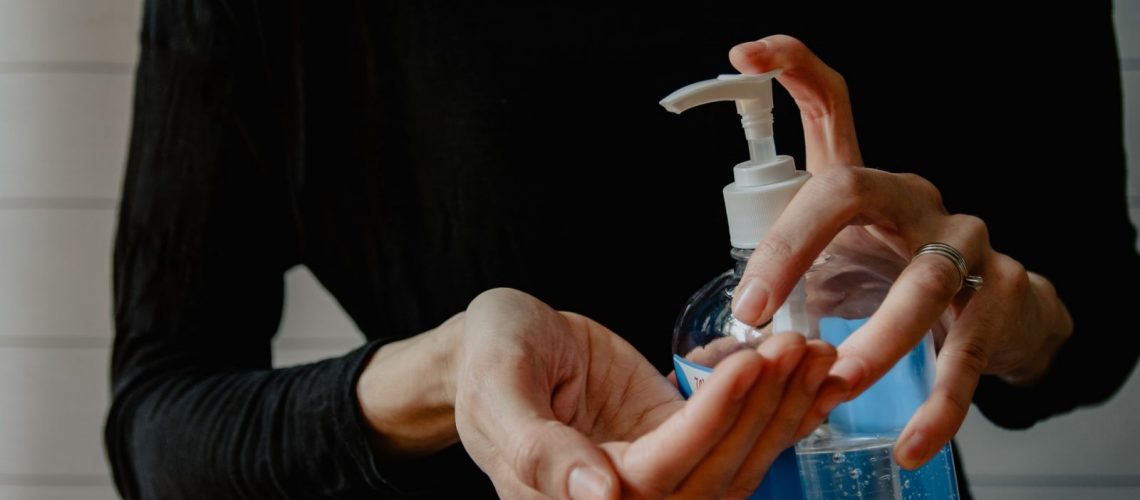Hand Sanitizer When my patients ask me what they can do to protect themselves from the spread of germs, my answer is always the same; “wash your hands with soap and water every chance you get.” Why then is there such a push toward the use of hand sanitizers? Studies show that using alcohol-based hand sanitizers is a safe, effective method of disinfecting hands between regular hand washing and should be used only as a supplement.
You see dispensers everywhere, in schools, hospitals, child care centers, airports, and atop the gangways of cruise ships. I have to confess I make instant hand sanitizers readily available in my office. In as much as alcohol-based rubs are helpful in curbing the spread of germs on hands that aren’t visibly soiled there may be some concern regarding their use. I tell my patients that there is good news and bad news when it comes to hand sanitizers. Here’s what I mean.
Pros and Cons for the Use of Hand Sanitizers
Not all brands of hand sanitizers are the same. A study published in the journal of Emerging Infectious Diseases disclosed that at least one brand did not contain the necessary 60 percent alcohol needed to kill harmful bacteria and viruses. The concentration of ethyl alcohol, ethanol, or some variation should be between 60 and 95 percent in order to be effective so be sure to read the label before buying the product. Most brands of hand sanitizers look the alike, same bottle, pump and price.
Hand sanitizers are not recommended in place of soap and water because alcohol doesn’t cut through grime, so dirt, blood, feces or other soil should be away washed first. If soap and water is not available, of course, alcohol-based rubs are a healthy precaution. For instance, if you sneeze in the car, or you are immobile, or you stop to put in contact lenses by all means use your hand sanitizer. Studies have shown that micro-organisms are much more prevalent on phone receivers, computer keyboards, and desk tops so using a hand sanitizer in this situation is a good idea.
As a dermatologist, I caution my patients to be careful not to overuse sanitizers because they can dry out the skin due to their alcohol content. If you have dry, cracking skin you should avoid using an alcohol based product until your skin has healed since it may only exacerbate your condition. If bacteria get into the cracks of your skin it can lead to infection.
Knowing how much to use is important too. Use enough gel to cover your hands thoroughly on all sides. The rule of thumb is if your hands dry within 10 to 15 seconds you haven’t used enough. If you are a parent or grandparent, you may want to consider using hand sanitizers on children only when necessary and always keep alcohol-based gels out of children’s reach.
Keep in mind that any product containing alcohol is flammable and should not be stored or used anywhere near heat or fire. Make sure your hands are completely dry before using a cigarette lighter or other lighting device.
Germ Killing Soaps
The major objective of using hand sanitizers is to kill germs before they can spread or make you sick. There are a number of household products containing germ-killing ingredients in addition to alcohol-based gels and creams. You see ads everywhere for anti-bacterial hand soap, dishwashing liquid, cleaning fluids, and many more.
If you are confused about what to buy to protect yourself and your family from harmful bacteria you are not alone. Let’s take a look at a few terms and their function to help you sort out which product is best for the job.
• Antimicrobials – a general term for an ingredient that kills bacteria, viruses, or molds.
• Antibacterials – only effective against bacteria
• Disinfectants – products that kill micro-organisms (usually both bacteria and viruses) on surfaces like countertops
• Antiseptics – products for use on skin for cuts and scrapes
In 2005, an FDA advisory panel of experts decided that antibacterial soaps were no more effective than regular soap and water in fighting infections. Most soap contains an ingredient called triclosan that kills bacteria but has little or no effect on viruses. It’s important to note that not all microbes are bad for us. Beneficial microbes are helpful to our digestive tract and are needed to help our blood to clot when we get a cut. There is some speculation that limited exposure to bacteria in the environment actually helps to develop your immune system.
Always read the label and be careful when buying a product that claims to have germ killing ingredients. There are a number of alternative antimicrobials available that are also non-toxic:
• Vinegar and borax are excellent agents for cleaning but will not disinfect.
• Tea tree oil, grapefruit seed extract are often used as disinfectants and are used as ingredients in some commercial products.
• Hydrogen peroxide is one of the safest disinfectants on the market and can be purchased as an over the counter antiseptic. Be sure that the concentration of hydrogen peroxide is not more that 3 percent. A higher percentage is dangerous and should not be used for this purpose.
We all want to do what we can to prevent the spread of germs but remember there is nothing better than good old fashioned soap and water. Wash your hands frequently. Consider using non-toxic ingredients that are not only easier on your skin but better for the environment as well!

